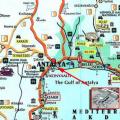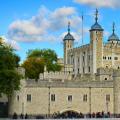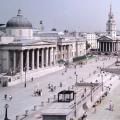Famous scientists and their contribution to the development of physics CC # 1862, 7 "B" class Halaiji Alexey, Yasinovsky Matvey
Giordano Bruno Albert Einstein Galileo Galilei Nikolai Copernicus Mikhail Lomonosov Michael Faraday Isaac Newton Nikola Tesla
They all played a very important role in the history of the development of physics.
Nicolaus Copernicus (1473-1543) After thirty years of hard work, long observations and complex mathematical calculations, he proved that the Earth is only one of the planets, and that all the planets revolve around the Sun. Copernicus believed that to an observer on Earth, it seems that the Earth is motionless, and the Sun moves around it. In fact, it is the Earth that moves around the Sun and performs full turn in its orbit.
Giordano Bruno's ideas were centuries ahead of his time. He argued that not only the Earth, but also no other body can be the center of the world, since the Universe is infinite and there are an infinite number of "centers" in it. He argued that there is a variability of bodies and the surface of our Earth, believing that over huge periods of time "seas turn into continents, and continents - into seas." Giordano Bruno (1548-1600)
Galile? About Galile? D - Italian physicist, mechanic, astronomer, philosopher and mathematician who had a significant influence on the science of his time. He was the first to use a telescope to observe celestial bodies and made a number of outstanding astronomical discoveries. Galileo is the founder of experimental physics. With his experiments, he convincingly refuted the speculative metaphysics of Aristotle and laid the foundation classical mechanics... Galileo Galilei (1564-1642)
Sir Isaa? To New? To? N - English physicist, mathematician and astronomer, one of the founders of classical physics. The author of the fundamental work "Mathematical Principles of Natural Philosophy", in which he outlined the law universal gravitation and the three laws of mechanics that became the basis of classical mechanics. Developed differential and integral calculus, color theory and many other mathematical and physical theories. Isaac Newton (1642-1727)
Mikhail Vasilievich Lomonosov - the first Russian natural scientist of world importance, encyclopedist, physicist and chemist; he was the first to define physical chemistry; his molecular-kinetic theory of heat in many ways anticipated the modern understanding of the structure of matter. Many fundamental laws, including one of the beginnings of thermodynamics; laid the foundations of the science of glass. Mikhailo Lomonosov (1711-1765)
Michael Farade? Th - English physicist and physicist-chemist, the founder of the doctrine of the electromagnetic field. Faraday was fascinated by the problem of the relationship between electricity and magnetism. Faraday experimentally discovered the phenomenon of electromagnetic induction - the appearance of an electric current in a conductor moving in a magnetic field and gave a mathematical description of this phenomenon, which is the basis of modern electrical engineering. Faraday discovers electrochemical laws that form the basis of a new branch of science - electrochemistry, which today has a huge number of technological applications. Michael Faraday (1791-1867)
Ni? Kola Te? Sla-physicist, engineer, inventor in the field of electrical and radio engineering. Tesla's work on the properties of electricity and magnetism formed the basis for modern AC devices. Tesla was considered "the man who invented the 20th century." After showing radio and winning the War of the Currents, Tesla was widely recognized as an outstanding electrical engineer. Tesla's early work paved the way for modern electrical engineering, his discoveries early period had an innovative value. Nikola Tesla (1856-1943)
Albe? Rt Einshte? In is a theoretical physicist, one of the founders of modern theoretical physics. Einstein developed several significant physical theories, including. the theory of relativity and within its framework - the law of the relationship of mass and energy: E = mc2. He predicted "quantum teleportation" and worked on the problems of cosmology and the unified field theory, which refers to the revision of the understanding of the physical essence of space and time, to the construction of a new theory of gravity to replace Newtonian one. Einstein's concepts, repeatedly confirmed by experiments, form the foundation of modern physics. Albert Einstein (1879-1955)
Thank you for your attention! Your questions?
Nicolaus Copernicus () Nicolaus Copernicus () After thirty years of hard work, long observations and complex mathematical calculations, he proved that the Earth is only one of the planets, and that all the planets revolve around the Sun. Copernicus believed that to an observer on Earth, it seems that the Earth is motionless, and the Sun moves around it. In fact, this Earth moves around the Sun and makes a complete revolution in its orbit during the year.
Giordano Bruno's ideas were centuries ahead of his time. He argued that not only the Earth, but also no other body can be the center of the world, since the Universe is infinite and there are an infinite number of "centers" in it. He argued that there is a variability of bodies and the surface of our Earth, believing that over huge periods of time "seas turn into continents, and continents - into seas." Giordano Bruno () Giordano Bruno ()

Galileo Galilei was an Italian physicist, mechanic, astronomer, philosopher and mathematician who had a significant influence on the science of his time. He was the first to use a telescope to observe celestial bodies and made a number of outstanding astronomical discoveries. Galileo is the founder of experimental physics. With his experiments, he convincingly refuted the speculative metaphysics of Aristotle and laid the foundation for classical mechanics. Galileo Galilei () Galileo Galilei ()
Sir Isaac Newton is an English physicist, mathematician and astronomer, one of the founders of classical physics. The author of the fundamental work "Mathematical Principles of Natural Philosophy", in which he outlined the law of universal gravitation and three laws of mechanics, which became the basis of classical mechanics. Developed differential and integral calculus, color theory and many other mathematical and physical theories. Isaac Newton () Isaac Newton ()
Mikhail Vasilyevich Lomonosov, the first Russian natural scientist of world importance, encyclopedist, physicist and chemist; he was the first to define physical chemistry; his molecular-kinetic theory of heat in many ways anticipated the modern understanding of the structure of matter. Many fundamental laws, including one of the beginnings of thermodynamics; laid the foundations of the science of glass. Mikhailo Lomonosov () Mikhailo Lomonosov ()
Michael Faraday is an English physicist and physicist-chemist, the founder of the theory of the electromagnetic field. Faraday was fascinated by the problem of the relationship between electricity and magnetism. Faraday experimentally discovered the phenomenon of electromagnetic induction, the emergence of an electric current in a conductor moving in a magnetic field, and gave a mathematical description of this phenomenon, which is the basis of modern electrical engineering. Faraday discovers electrochemical laws that form the basis of a new branch of the science of electrochemistry, which today has a huge number of technological applications. Michael Faraday () Michael Faraday ()
Nikola Tesla physicist, engineer, inventor in the field of electrical and radio engineering. Tesla's work on the properties of electricity and magnetism formed the basis for modern AC devices. Tesla was considered "the man who invented the 20th century." After showing radio and winning the War of the Currents, Tesla was widely recognized as an outstanding electrical engineer. Tesla's early work paved the way for modern electrical engineering, and his early discoveries were innovative. Nikola Tesla () Nikola Tesla ()
Albert Einstein is a theoretical physicist, one of the founders of modern theoretical physics. Einstein developed several significant physical theories, including. the theory of relativity and, within its framework, the law of the relationship between mass and energy: E = mc2. He predicted "quantum teleportation" and worked on the problems of cosmology and the unified field theory, which refers to the revision of the understanding of the physical essence of space and time, to the construction of a new theory of gravity to replace Newtonian one. Einstein's concepts, repeatedly confirmed by experiments, form the foundation of modern physics. Albert Einstein () Albert Einstein ()
other presentations on the topic "Famous Scientists and Their Contribution to the Development of Physics"
"Development of physics"- The recently deceased Soviet physicist A.S. Kompaneets was of the same opinion. Pioneer of high-frequency technology (generators, transformer, etc.; 1889-91). Physics discovers and studies the laws of nature, properties and structure of matter. There were always questions that stubbornly did not find an answer. Developed multiphase electrical machines and multiphase current distribution schemes.
"Lomonosov contribution"- The influence of Lomonosov as a poet is especially great. The same as a horse without a tail. In January 1955. The “decree on the establishment of a university in Moscow” was signed by Yelizoveta. Catherine canceled her decree. At the age of 14 he mastered Magnitsky's "Arithmetic" and Smotritsky's Slavic grammar. An outstanding place in the biography of Mikhail Vasilyevich is occupied by the organization of the first university in Russia.
"Physicists - mechanics"- Gaining knowledge about mechanics and its discoverers, about Newton, Euler and Lagrange. The tasks of mechanics were defined by Newton with complete clarity. "Newton's Principles" consisted of three laws, which he himself formulated. Newton introduced into physics the concept of mass as a measure of inertia and, at the same time, gravitational properties.
"Scientist MV Lomonosov" - The founder of the Russian solemn (addressed to the rulers) and philosophical ode. Lamellar-tabular discharge up to 5 x 4 x 0.3 cm. Mineralogy. Lomonosov worked in the mineral cabinet from 1741. The academy received answers to the questionnaire for almost 10 years. The qualities of a morally educated person: patriotism, mercy, hard work.
"The great scientist Lomonosov"- He was buried at the Lazarevskoye cemetery of the Alexander Nevsky Lavra. M.V. Lomonosov's contribution to the development of rhetoric. Saint Petersburg. Literacy training. “The power of delight turned the naturalist into a poet” *. And then Mikhailo learned to read and write. The name of MV Lomonosov in natural science.




